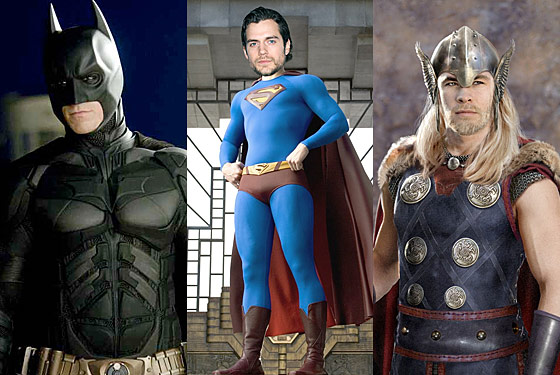
Superheroes can usually beat any obstacle with the help of their massive strength and superior weapons, but thereÔÇÖs a new problem on the horizon that none of them can seem to overcome: outsourcing. This weekÔÇÖs announcement that British actor Henry Cavill would play the title role in Zack SnyderÔÇÖs Superman is only the latest example; he joins the Welsh Christian Bale (as Batman), British-raised Andrew Garfield (as Spider-Man), Australian Chris Hemsworth (as Thor), and even Canadian Ryan Reynolds (as Green Lantern) as foreigners cast whoÔÇÖve been cast as classic, American-identified superheroes. Only Chris Evans in the upcoming Captain America bucks that trend, but even that casting race came with unusual stipulations ÔÇö the role was restricted only to American actors (which hindered Romanian-born Sebastian Stan, the actor who got the runner-up prize of the heroÔÇÖs sidekick), and even then, the production came up blank after months of casting and had to extend a last-minute offer to the reluctant Evans. WhatÔÇÖs to blame for the domestic superhero shortage? Vulture asked industry professionals for their takes on the situation.
The ugly truth is that American leading men just arenÔÇÖt terribly manly anymore, says John Papsidera, the casting director on both The Dark Knight and The Dark Knight Rises.
ÔÇ£You look at the list of American leading men, and in their twenties and thirties, theyÔÇÖre very boylike,ÔÇØ he says, adding, ÔÇ£Take Jesse Eisenberg: I put him in Zombieland, but heÔÇÖs not going to play Superman. HeÔÇÖs much closer to what Dustin Hoffman turned into than John Wayne or Steve McQueen. ItÔÇÖs hard to find movie stars that live up to the needs of the story. Leo [DiCaprio] is growing into it, but for a long time, he seemed young and boylike. Inception was the first time Leo seemed to have fully grown into a man. You need to find guys who carry that heroic-ness with them.ÔÇØ
Of course, Papsidera acknowledges are other reasons for the decline of the American-as-superhero: Cable TV networks have defined themselves by high-quality series like Mad Men and True Blood that have taken many potential American leading men off the spandex-suit market, including actors like Joe Manganiello and Matthew Bomer, who were mentioned for Superman but already had series commitments. And having spent billions to acquire the rights to all these comic-book superheroes, HollywoodÔÇÖs studios are eschewing many of those American leading men precisely because theyÔÇÖre too closely associated with those highly recognized American television roles.
As Louise Ward, an agent at United Talent who represents young leading men like Channing Tatum explains, ÔÇ£The studios are highly invested in these superheroes as brands. As such, they donÔÇÖt usually want [an actor with] the baggage of another role, and they often canÔÇÖt have an affiliation with another role.ÔÇØ Papsidera echoes this: ÔÇ£Kids are not so easily fooled anymore. TheyÔÇÖll say, ÔÇÿOh, itÔÇÖs that guy from Gossip Girl!ÔÇÖ or ÔÇÿItÔÇÖs the girl from The O.C.!ÔÇÖÔÇØ But he thinks thereÔÇÖs a larger problem at work here.
ÔÇ£I believe thereÔÇÖs been a certain feminization of the American male,ÔÇØ he says. ÔÇ£As a result, there are a lot of ÔÇÿmamaÔÇÖs boys.ÔÇÖ Kids are raised like veal. WeÔÇÖre afraid to let them play soccer. That kind of nurturing softens what weÔÇÖre used to seeing on the screen. American men arenÔÇÖt men on the screen.ÔÇØ
Papsidera says heÔÇÖs had to turn to Canada, Australia, and the U.K. to fill our growing superhero testosterone gap.
ÔÇ£There, theyÔÇÖre still raised as men. Heath [Ledger] was a manÔÇÖs man. Guys like Henry Cavill, thereÔÇÖs an easy masculinity to them. But because of how predominant the sixties and the womenÔÇÖs movement were here, guys in America talk about their ÔÇÿfeelingsÔÇÖ far more than guys from New Zealand and Australia or Ireland.ÔÇØ
One leading talent agent agrees that American leading men are increasingly less than hypermasculine, but thinks that Papsidera may have it backwards: ItÔÇÖs not that American men arenÔÇÖt allowed to act manly; itÔÇÖs that manly American men arenÔÇÖt allowed to act.
ÔÇ£By the time a kid reaches 12 or 13 in America, if heÔÇÖs displayed any talent for them, heÔÇÖs steered towards athletics in high school,ÔÇØ offers the agent. ÔÇ£Kids who want to do theater, or study acting, well, theyÔÇÖre immediately labeled ÔÇÿwimpsÔÇÖ or worse, ÔÇÿfags.ÔÇÖ Whereas, in the U.K., thatÔÇÖs absolutely not the case: ItÔÇÖs not considered weird to act and play soccer over there, or to sing and play rugby. And so by the time some of the more better-looking, rugged American guys whoÔÇÖve been, say, modeling decide maybe theyÔÇÖre interested in acting, itÔÇÖs too late: The U.K. guys have had so much more and so much better training, itÔÇÖs not even a fair fight. Our guys donÔÇÖt stand a chance.ÔÇØ
Another top casting agent who works in the comic-book genre adds that thereÔÇÖs a third problem, and itÔÇÖs the reason that actors like Ryan Gosling unilaterally turn down superhero roles: ÔÇ£The big name guys arenÔÇÖt interested, because many of them think comic books are soap operas for boys. And since the ascendancy of reality TV, a lot of the younger American actors donÔÇÖt feel they need to be in [acting] class as much ÔÇö Stella Adler, or ÔÇÿmethodÔÇÖ or whatever training or skill youÔÇÖd normally want to focus on ÔÇö and if youÔÇÖre young and particularly good-looking, you might not even have had to. But in the superhero world, people need to believe things that are far-fetched. There has to be some sort of vulnerability or pathos for that person to be relatable. In the U.K., itÔÇÖs the norm to do a lot of theater, so they know how to act with their entire bodies. And thereÔÇÖs a lot less work there, so they work a lot harder for everything.ÔÇØ
So weÔÇÖre full circle: These superhero-eligible foreigners have the immigrant work ethic. WhatÔÇÖs more American than that?

